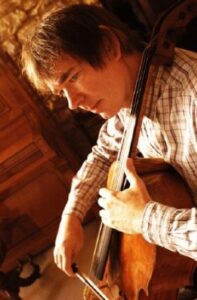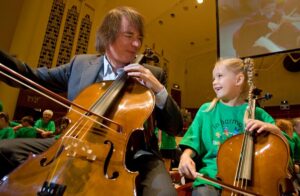Talking to cellist, educator and broadcaster Julian Lloyd Webber.
Julian Lloyd Webber is one of the biggest names in British classical music. He spent several years as principal of the Royal Birmingham Conservatoire and has launched two series of the Classic FM 30 under 30 Rising Stars Project. On Thursday 17th November Sky Arts will broadcast a one-hour specal featuring six of these young artists and we spoke to Julian how the idea came about.
“It really came out of lockdown. At the time I was still principal of the Conservatoire and I was completely aware of the difficulty of young musicians, both students and young professionals, in finding outlets for all the hours of practice they were doing. There were no public performances, musicians, in fact all people in the arts, live to bring what they’re doing to an audience and suddenly it was gone. So I went to Classic FM with the idea of doing a programme, since live performances had gone, doing it round the younger artists that have started recording. They thought it was a great idea and we’re now on the second series so we’ve had sixty under thirty, and the best news is that Sky Arts have come onto it and we have a programme this coming Thursday. If people can tear their eyes away from Matt Hancock it’s well worth watching.”

Are there any former Conservatoire students amongst those chosen?
“I sneaked two in. There’s Segun Akinola, who composed music for Doctor Who, and a terrific viola player called Yeu Yu. She’s got a solo CD just out with Naxos and it’s brilliant. The Conservatoire’s on a roll, two out of last three BBC Young Musicians have been students there.
“The other piece of good news is that the Conservatoire have just appointed my successor, which has taken them two years. Stephen Maddock has been running the CBSO for 23 years. They’ve kept it in house, he’s local and he knows the city, he knows the area.”
You spent five years at the Conservatoire. What brought you to Birmingham?
“They were moving to a new purpose-built hall on the Eastside. It used to be a not very gracious building near Victoria Square that was demolished before the Conservatoire and for a year we didn’t have a concert hall but I loved being there. I had to stop playing in 2013 because I had a herniated disc in my neck and I lost power in my bowing arm. I couldn’t go on playing as a solo cellist so I was looking for something else. My father was massively involved with music education, I had set up a programme with the then-Labour government called In Harmony, which is still going today after a few regime changes. The idea is to bring music to children who wouldn’t otherwise have access to it in some of the most deprived areas of the UK and it’s gone really well.”
You weren’t just a figurehead at the Conservatoire, you really did give it your all.
“Thank you for saying so. What’s the point of doing it if you don’t give your all? I moved up to live in Birmingham, everyone thought I would come up every so often but I was there all the time. I wanted my family settled, my daughter went to school in Birmingham. The real draw was that they were moving to this wonderful new building. I think it’s the best facility for any music college in the UK.
“Look at Symphony Hall, Town Hall and now the main hall in the Conservatoire, the Bradshaw which holds 500 people and should be used a lot more. Peter Francis, the new deputy vice-chancellor of Birmingham City University where the Conservatoire is based, is determined to get all kinds of events into that hall. You’ve got Symphony Hall holding 2,000 and Town Hall a thousand but there are some really good things you could have in a 500 seater. For some kinds of artists the Bradshaw Hall is perfect.
Birmingham is known for its popular musical heritage but not so much in the classical genre. Could you enlighten us Philistines about Birmingham’s classical music history?
“It’s massive, and it’s all basically focused around the Town Hall. Elgar was often conducting there, there were the first performances of some amazing pieces; Elijah by Mendelssohn, Dvorak conducted in the Town Hall. It has a hugh trditon which I’ve always been fascinated by because one of my favourite artists of all time, Buddy Holly, played there, along with the Stones as everyone knows. It has a fascinating history. London doesn’t have a great hall for orchestral music, everybody knows they all have their problems; Birmingham is really fortunate to have three great concert halls. The Bradshaw is a hidden gem.”

What would you say is your legacy at the Conservatoire?
“Lots of things happened. We got the royal title, which is massively important for an international college, that royal title still carries enormous weight. The other music colleges around the country, you have the Royal College and the Royal Academy in London, the Royal Welsh, the Royal Northern, and now Birmingham has that title.
“It wasn’t easy to get it, and nor should it be, it was only because of the strength of the work that we were doing and even then you have to get the approach right. You only get one shot at it. The music part also merged with the acting school which wasn’t easy but it went through smoothly. We also got some incredible artists playing there, classical music legends such as James Galway, Danielle de Niese, Nicola Benedetti.”
And what would you like to emerge from the 30 under 30 series?
“A greater awareness of the selflessness of these young musicians. They practice six hours a day, there’s no saying that they’re going to make it, you don’t go into classical music with the idea of making lots of money. In the rare exception it’s possible but it’s not why you go into classics. They’re going into it because they love it and they want to bring it to a much wider audience. I think that’s what the Sky Arts programme will do.”
Classic FM Rising Stars With Julian Lloyd Webber 2022 broadcasts on Sky Arts on Thursday 17th November at 8pm.


